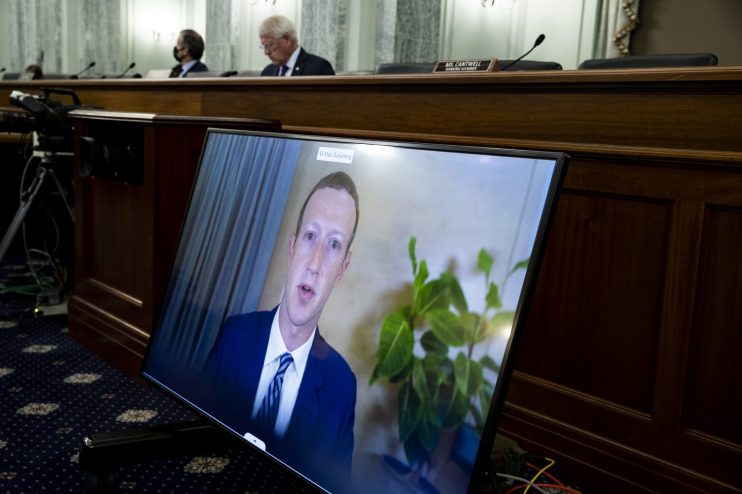Tech bosses blasted by US politicians over content moderation

The bosses of Facebook, Twitter and Google faced attacks from US Senators this afternoon during a fiery hearing over how tech firms moderate content on their platforms.
The tech chiefs were grilled by a US Senate committee for more than three and a half hours over Section 230 of the Communications Decency Act, which protects internet companies from liability for content posted to their platforms.
Twitter chief executive Jack Dorsey, Google boss Sundar Pichai and Facebook’s Mark Zuckerberg all threw their weight behind the law, although they appeared open to moderate changes to the rules.
The tech chiefs said the law, which has come under scrutiny from both sides of the US political spectrum, was key to protecting free speech on the internet.
Dorsey warned the committee that weakening Section 230, which also contains a so-called Good Samaritan provision to protect companies from liability when they are removing content, would harm how people communicate on the internet.
Pichai insisted that Google operated without political bias, arguing that doing otherwise would be against its business interests.
The committee initially struggled to establish a connection with Facebook boss Mark Zuckerberg.
He came out in support of a change to Section 230, though he will warn that tech giants are likely to be more censorious in order to avoid legal risks if the law is changed.
All three bosses agreed that the companies should be held liable if the platforms act as a publisher, but denied they acted as referees on political speech.
Political attacks
Republican senator John Wicker, who chairs the committee, said the regulations had protected companies from “potentially ruinous lawsuits”.
“But it has also given these internet platforms the ability to control, stifle, and even censor content in whatever manner meets their respective standards. The time has come for that free pass to end,” he said.
But the hearing soon descended into a pre-election showdown as Senators mounted attacks on the social media firms and each other.
Twitter boss Dorsey denied his site was able to influence elections, sparking a furious response from Republican Ted Cruz.
“Who the hell elected you and put you in charge of what the media are allowed to report and what the American people are allowed to hear,” he said, referencing Twitter’s decision to block two New York Post stories that made unverified claims about Joe Biden’s son.
Committee chair Wicker also attacked Twitter and Facebook over the New York Post stories, and slammed Twitter for removing posts by Trump but not taking action against alleged misinformation from other world leaders.
But Democrats hit back at their opponents, arguing that the hearing was being held to help Trump’s re-election efforts.
Senator Brian Schatz dismissed the proceedings as “nonsense”, adding: “This is bullying and it is for electoral purposes.”
Content crackdown
The probe comes amid rising scrutiny over how tech firms police content posted to their platforms.
US President Donald Trump has led calls for a reform to Section 230 amid accusations that social media platforms were stifling conservative voices.
It came after a number of Trump’s social media posts were flagged or removed for containing false or misleading material, as well as Twitter’s decision to block the New York Post stories.
In a rare instance of cross-party support, Biden and Democrats have also expressed support for a reform of the liability laws.
However, their scrutiny is focused on tech firm’s perceived failure to clamp down on harmful content and misinformation.
The US hearing comes alongside similar moves by the EU to hold tech giants responsible for the material posted by their uses.
Alongside moves to tackle anti-competitive practices, the upcoming EU’s Digital Services Act is expected to set out new measures on harmful and illegal content.